#Composition Book Chronicles
Explore tagged Tumblr posts
Text
This Can’t Be Life - A Russian Agent on full display

View On WordPress
#art#artist#comic#Comics#Composition Book Chronicles#con queso publishing#cq comics#Donald Trump#Elon musk#illustration#illustrator#russia#This Cant Be Life#ukraine#United States of America#Vladimir putin#volodymr Zelenskyy
21 notes
·
View notes
Text
If they body swap Daniel and Raglan James I will probably quit the show. They can pry Eric Bogosian’s Daniel from my cold dead hands I will accept no other Old Maniel.
#there is no real evidence that this will happen#I just had to get that off my chest#the only real thing that possibly maybe suggests this progression is that Daniel in the show may be a composite of Daniel and David#from the books#but I have my doubts about that#iwtv spoilers#tvc spoilers#the vampire chronicles spoilers#book spoilers#interview with the vampire spoilers
4 notes
·
View notes
Text

[image ID: a short list, where each successive item is on a new line. it reads "A: dastardly opening", "B: clarinet anthropocentrism", and "C: evil fuck melody". the image has a white background and very dark grey text. the default font and the specific colour are indicate this is a screenshot from the icloud notes app. end ID]
curated selection of the Very Important And Serious Descriptors of the first few sections of my Very Important And Serious Composition that's premiering soon . i am studying a real degree and they are going to give it to me when im done (affirmation)
#i was going to post a photo of where i originally wrote this in my book#but 1) too much effort to get it ok to post and 2) my handwriting is frankly illegible#CLARINET ANTHROPOCENTRISM#uniposting#words of wyrm#composition tag#wyrm's musician chronicles#music composition
4 notes
·
View notes
Text
Likes don’t increase visibility to others! Please reblog this to spread the word!
I think Werewolf is an inherently queer medium
This is all a part of a larger long-term project.
I am trying to hold the World of Darkness to higher standards of inclusivity
Read our introductory comic here

Werewolf: the Essentials Project Update 04/02/2025
Hello, Kinfolks. Woof. What a time to be alive. This is a period that's been reflected many, many times in the past under many different names. It seems like every time I pick up my phone there is always some new awful thing awaiting us. The intentional composition of the writers on this team are diverse and come from cultures across the world, and what ties us together has been our queerness, our passion for Werewolf, and our commitment to let our passions fuel our writing. The result has been a product that shows the passion from one page to the next.
In short, the state of the world has impacted the pace at which we're working on the book. The priority right now is survival, and surviving is the task that has consumed most of the attentions of those helping with W:tE. It should come as no surprise that people who passionately care about Werewolf also care about the world around them at large, and that is exactly what many of us are doing.
All the same, what's agreed between everyone on the team is that we all feel the work we're doing matters, and in many ways it can be a good way to keep one busy when the other option is the good-old doomscroll. And so, work is still happening, and beyond that, its starting to pick up again.
So, what work remains?
Writing
Writing is more or less finished. Editing is ongoing and as small issues or missing mechanics come up we've been working them in. Chapters 1-7 are complete, and Chapter 8, our storytelling and chronicle section, is in its last few pages before calling it done. We have a small number of writers still working on this, and so far we're looking at 100 Rite of Passage Story Seeds, and 40-60 Cliath Story Seeds. All in all we're handing Storytellers enough game material to be able to keep their tables plenty busy for at least a year of weekly game sessions. Also as a spitball number, by the time this book hits shelves we are looking to be at around 450 pages.
Layout
We are at the 75% complete mark! Chapter 6 of 8 is underway. Due to an influx of support, we're able to have one of our editors pick up work on a more daily basis, so this process should similarly be speeding up in the immediate future. It always feels like the work is neverending, but slowly and surely we're making progress. I've promised myself once this book enters preflight I'm taking a long vacation.
Now, onto the fun stuff:
New W:tE Preview - Meet the Gaians!
With our full tribe writeups completed, we're happy to entice you with a new preview. For those ko-fi subscribers on the Fostern tier or above, you can now read not just our society and history dives, but can now see all the new tribes as written for Werewolf: the Essentials! This massive 80 page preview encompasses all twenty tribes of Gaians represented in Gulaka'i including background, territories, patron, and an all-new cultural outlook section!
All proceeds from ko-fi supporters help fund our commitment to using cultural consultants on our project!
To sign up and gain access to previews and our exclusive BTS discord to our project, subscribe to our ko-fi today! We've already raised $2,450 of our $3,500 goal!
I'd like to also extend a special thank you to my Adren and above supporters Durodragon, Tobias, Madame Badger, The Bohemian, and SmilingCoder for helping make this passion project a reality. THANK YOU!
#world of darkness#werewolf: the apocalypse#werewolf the apocalypse#werewolves#dead mountain#werewolf the essentials#wta#werewolf#w5#world building#wod5#wta5#htp#hunter the parenting
163 notes
·
View notes
Text
In book #8 Ax says that "Humans have very odd tastes. They think their music is beautiful. They are wrong. It is awful. All of it." But we must keep in mind that Ax's human friends listen to Nine Inch Nails. However, in Megamorphs #4: Back to Before, Ax refers to Heartbreak Hotel as "an awful musical composition," so he dislikes rock n roll as much as he dislikes industrial.
In The Andalite Chronicles, Elfangor describes Honky Tonk Women and (I Can't Get No) Satisfaction as "screaming sounds" and "weird human moaning that passed for music" but he also says that "with the wind in my face, and the music in my ears mingling with the loud roar of the engine, I didn't feel so badly." So Elfangor clearly enjoys The Rolling Stones, to some degree, right off the bat.
Clearly Andalites don't inherently dislike human music, and they do know what "music" is. Neither Ax nor Elfangor say that music in general is bad, only that human music is bad. They may be particularly put off by human music because of how many mouth sounds it includes, which would naturally be foreign to a species that doesn't have a mouth.
148 notes
·
View notes
Text

The bond between Patti Smith and Robert Mapplethorpe is one of the most poignant and artistically fertile friendships of the 20th century. Their story began in the late 1960s in New York City, where the two young dreamers met and began navigating a shared world of art, music, and poetry. Patti, a fledgling poet from New Jersey, and Robert, a budding photographer, first crossed paths at the Chelsea Hotel, a legendary haven for creatives like Janis Joplin and Dylan Thomas. What began as a romantic relationship quickly evolved into a profound friendship that would inspire both artists’ careers. Mapplethorpe’s portraits of Patti became iconic, especially the 1975 cover of her debut album, Horses, which remains one of the most striking images in music history. "He captured me in a moment of becoming," Patti later reflected, acknowledging how Mapplethorpe’s lens didn’t just see her but transformed her.
By the 1980s, Patti and Robert had taken divergent yet equally impactful paths. Patti moved to Michigan with her husband, Fred "Sonic" Smith, a guitarist for the MC5, and shifted her focus to family life and raising their two children. Meanwhile, Mapplethorpe’s photography career skyrocketed, fueled by his daring explorations of identity, sexuality, and the human form. However, the world he was documenting was also shrinking under the shadow of the AIDS epidemic. Robert’s health began to decline after his HIV diagnosis in the mid-1980s, but he refused to slow down. In 1988, just a year before his death, he held his final exhibit, The Perfect Moment, which stirred controversy for its explicit portrayal of gay BDSM culture. While some critics hailed the work as revolutionary, others labeled it obscene, igniting debates on censorship and public funding for the arts. Throughout this period, Patti and Robert stayed connected, their friendship unwavering despite physical distance and personal challenges.
The year 1988 was bittersweet for Patti, as it marked both her reunion with Mapplethorpe and the devastating loss of her husband, Fred. Robert, sensing his time was running out, asked Patti to sit for a family portrait with her children, a poignant acknowledgment of their enduring bond. This photograph, taken in New York City, captures not just a moment but a lifetime of shared experiences. In it, Robert’s presence looms large, his composition imbued with both fragility and strength. The same year, Patti released Dream of Life, her first album in nearly a decade, featuring the anthemic "People Have the Power." The record was a tribute to her husband and a testament to her belief in art’s ability to inspire change. Yet behind the music was a woman grieving deeply, caught between the joy of creation and the pain of loss. Robert, too, was battling his own mortality, channeling his remaining energy into a body of work that would cement his legacy as one of the most provocative and influential photographers of his time.
Robert Mapplethorpe passed away on March 9, 1989, leaving a void in Patti’s life that she would later articulate in her memoir, Just Kids. The book, published in 2010, serves as both a love letter and an elegy, chronicling their journey from struggling artists to cultural icons. It was Robert’s dying wish that Patti tell their story, a task she fulfilled with grace and raw honesty. "Nothing could separate us. Not even death," Patti wrote, encapsulating the depth of their connection. Today, their legacy lives on through the Mapplethorpe Foundation, which supports AIDS research and photography grants, and through Patti’s music and writing, which continue to inspire new generations. Their story is one of art, love, and resilience—a reminder that even in the face of loss, the creative spirit endures.
(History Through Photos)
#Patti Smith#Robert Mapplethorpe#Just Kids#art#Fred Sonic Smith#The Perfect Moment#AIDS activism#History Through Photos#stories
35 notes
·
View notes
Text

More than 5 years after my partner first gave me My Favorite Thing is Monsters as a Christmas gift, Volume 2 is finally here: the conclusion of Emil Ferris's epic coming-of-age story featuring young werewolf Karen Reyes. Her quest to solve the mystery of her neighbor's death continues. She discovers more family secrets, gets closer to her new friends, and wrestles with her sexuality and adoration of women. (Some spoilers ahead for Volume 1—if you haven't read it, you absolutely have to!)
The art is as impossibly gorgeous as ever, inked on composition paper, lines peeking through the frenzied storytelling, like a packed notebook you discover on the L, textured and smelling strongly of ink. Karen copies paintings from the Art Institute into the pages. The green lions of the museum come to life, her stuffed animal companion comments snarkily on her choices. She copes with her grief over her mother's death, is able to finally get her brother to tell her the full truth about his past, finishes the tapes chronicling Anka's story of surviving the Holocaust, and discovers much more about her queerness with the help of friends new and old.
This raw, beautiful book captures the urgency of Karen's teenage years, from her own self-discovery to the intense, dangerous dramas happening around her. The ending is a little abrupt, but perhaps it just felt that way because of how long I've been anticipating this story, and how much it sucked to see it end! Karen Reyes is an all-time character, and Ferris an all-time storyteller.
Content warnings for anti-Semitism, grief, domestic abuse, trafficking/implied sexual assault, racism, homophobia.
#my favorite thing is monsters#my favorite thing is monsters book 2#emil ferris#graphic novels#bookworm#my book reviews
28 notes
·
View notes
Text
A friendly wizard and style reference.
Midjourney has just released both the version 6 of its niji anime engine and the first version of its "style reference" tool.
Functionally this is a variation of the image prompting system (explained here), in which breaks a submitted image down into the 'token language' the AI uses internally and uses that as a supplement to a text prompt. "Style Reference" (or 'sref') lets you do this with up to three images, only with only the tokens associated with 'style' being drawn upon.
This is not to be confused with style transfer, a much older and very different AI art process.
But what is a style in this context? And how does it affect generation?
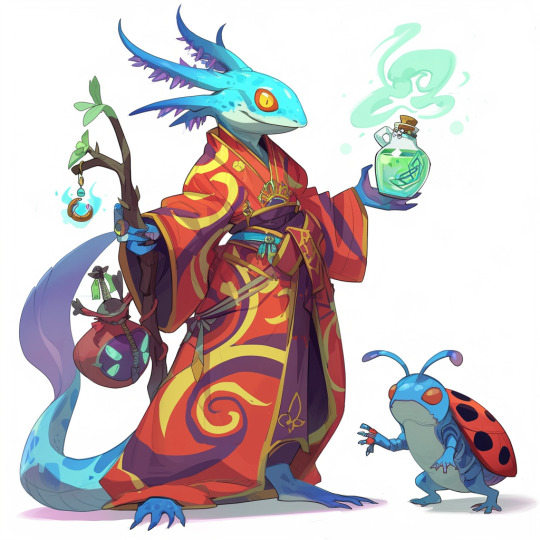
Prompt: a blue axolotl-anthro wizard in a red-and-yellow swirl-pattern robe, holding a sheleighleigh made of purple wood and a potion full of glowing green energy drink. A blue-and-green ladybug familiar stands near his feet, white background, fullbody image
Settings: --niji 6, --style raw --s 50 --seed 1762468963
Here, I've tested the same seed and prompt with a number of reference images.
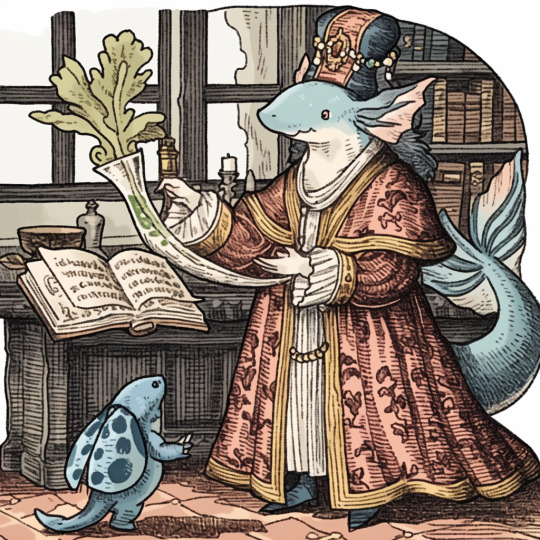
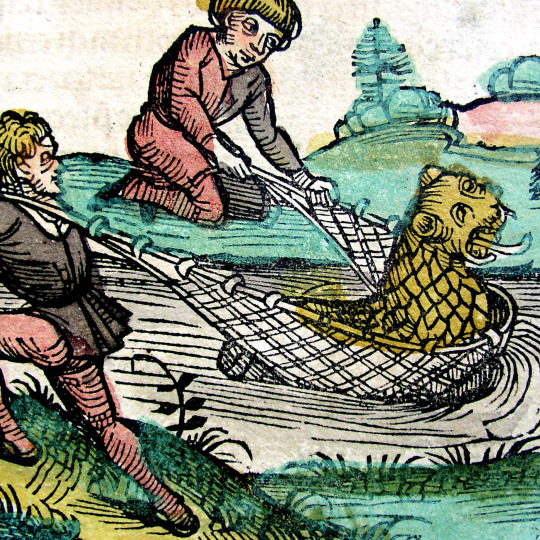
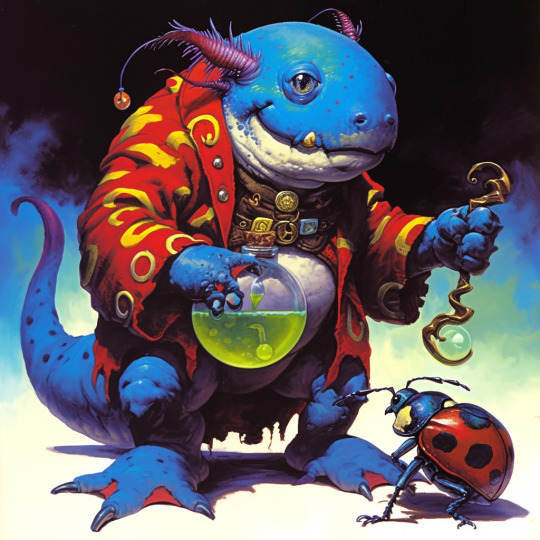
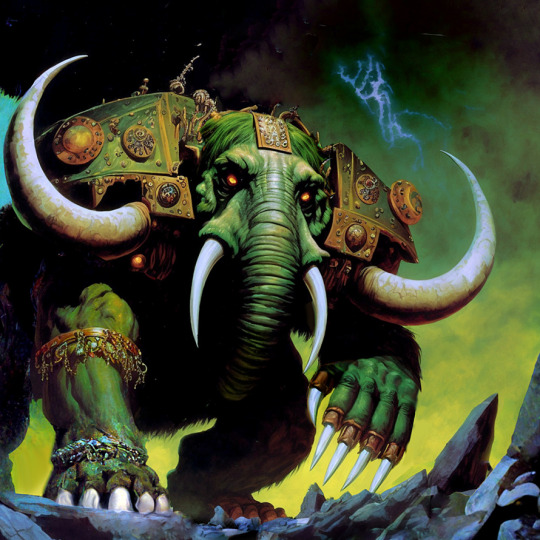
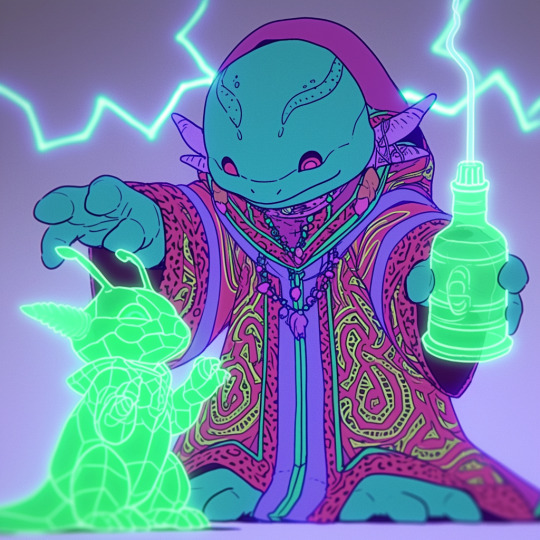
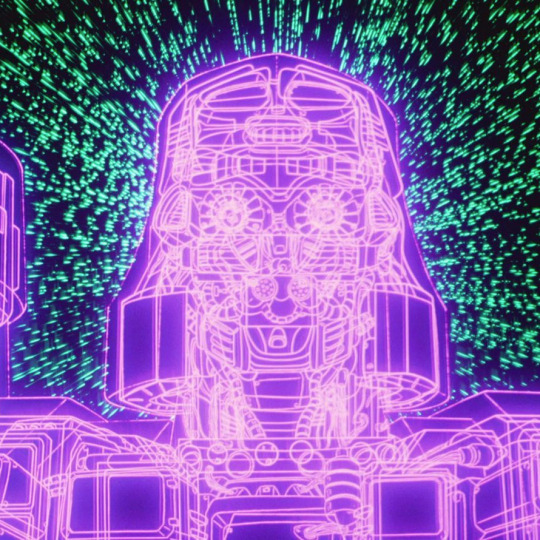
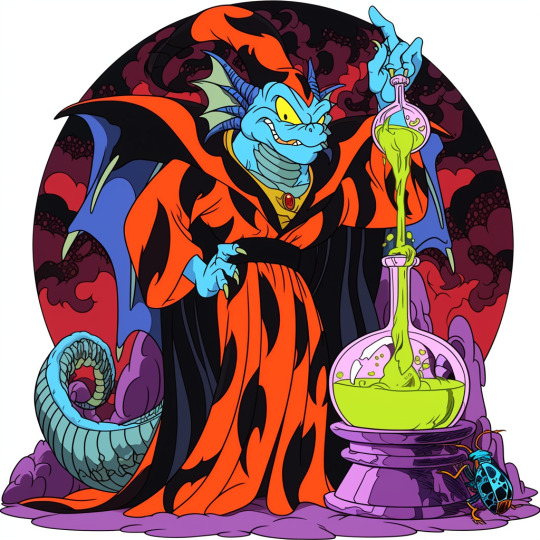
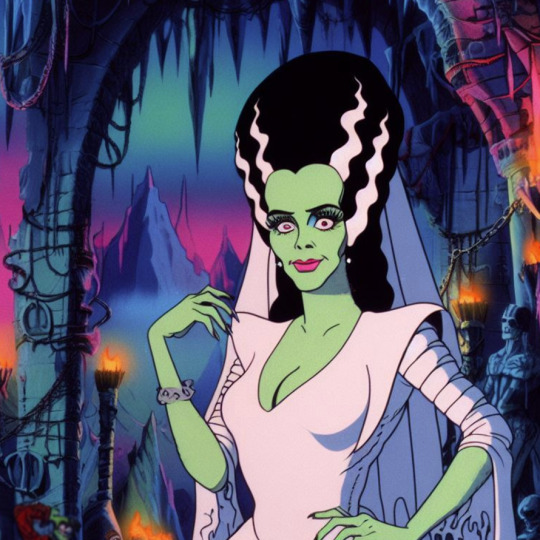
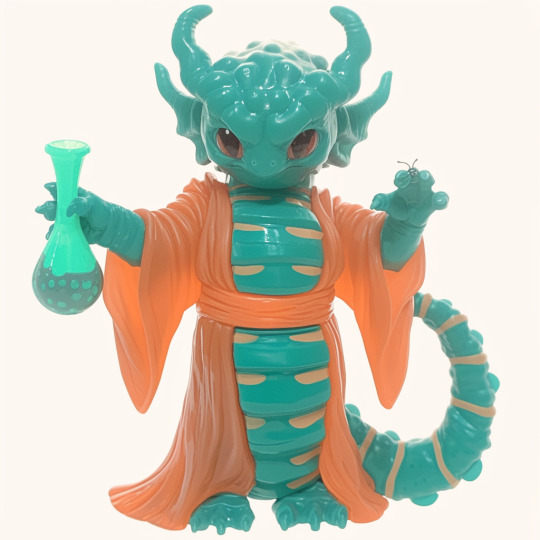
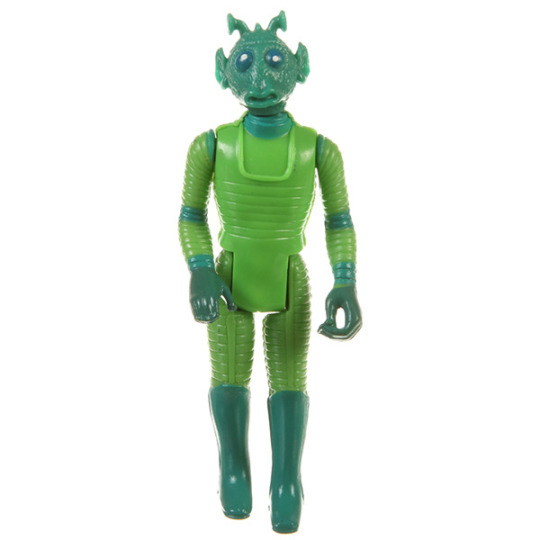
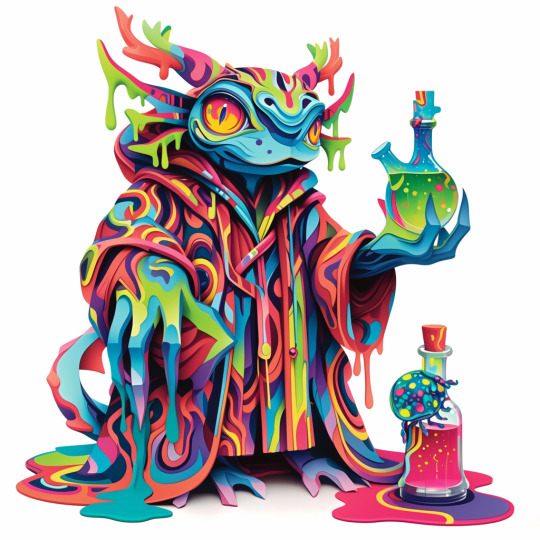

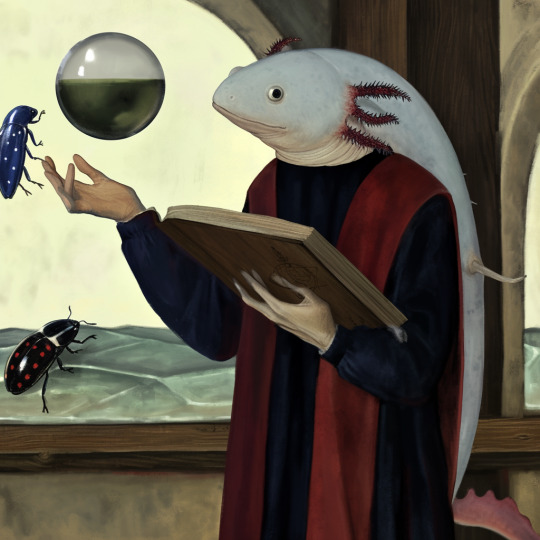
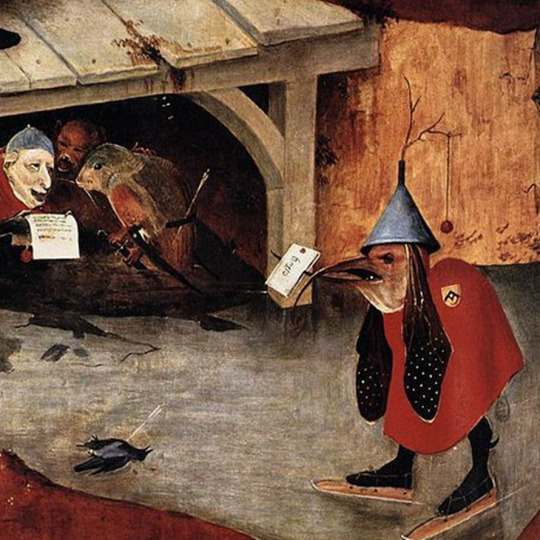
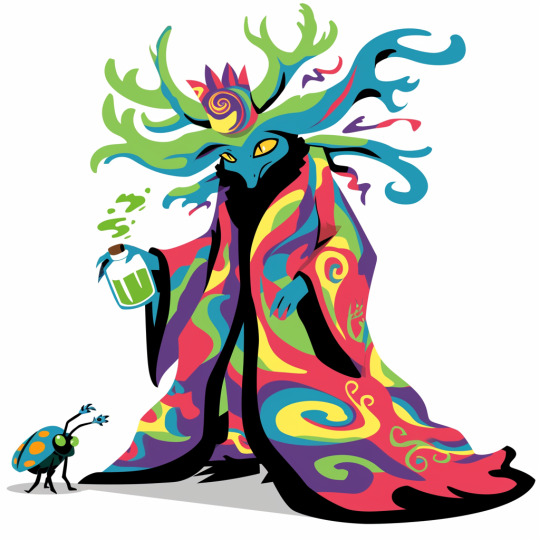
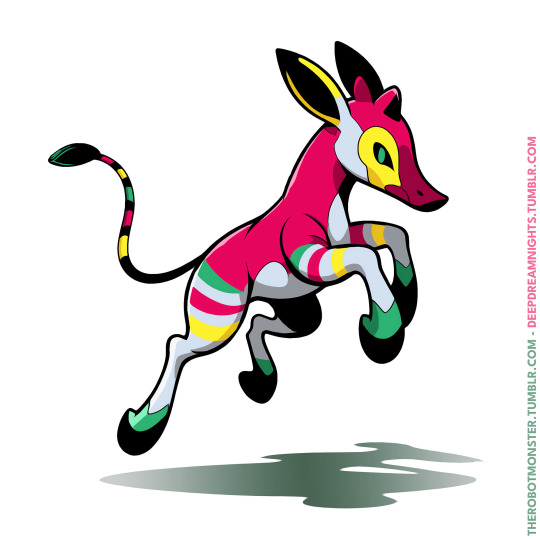
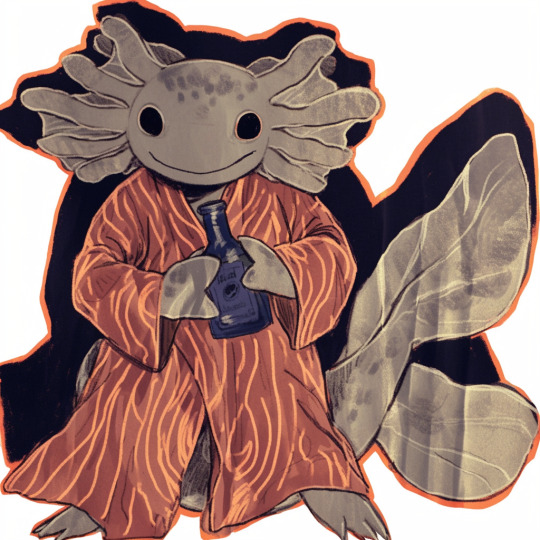

My semiorganized ramblings under the fold
The first thing I note is that style reference affects the gen so much that same-seed/different style ref comparisons are kind of pointless. Way too much of pose, composition and content changes for it to matter, so for future style ref tests, I'm probably going to drop the seeds.
The second thing I note is that there are certain limitations. You need to change up your prompt for things like photography, and the system interprets styles using its own criteria, not ours. If image prompting misinterprets something, so will style ref, but perhaps not in the same way.
This is notable for the one prompted with a scan from the Nuremberg Chronicle (first row). It recognizes that its a woodcut and emulates that general vibe nicely, but MJ is highly tuned for aesthetics, and emulating real world jank and clumsiness is a weak area. This is literally the first printed (european at least) book with illustrations. Every example thereafter is building on that skillset, so the dataset for woodcuts is going to be largely of a higher apparent quality.
In short, with Midjourney, additional prompt work is needed to replicate the look of early jank or intentionally 'ugly' art styles, and even as recent as v6 I've had no luck with things like midcentury Hanna-Barbereesque cheap TV animation styles or shitty 1990s CGI.
Style reference can help, I've gotten some pretty good cheap 80s-90s TV animation looking stuff from v6 niji and style ref in my early tests:
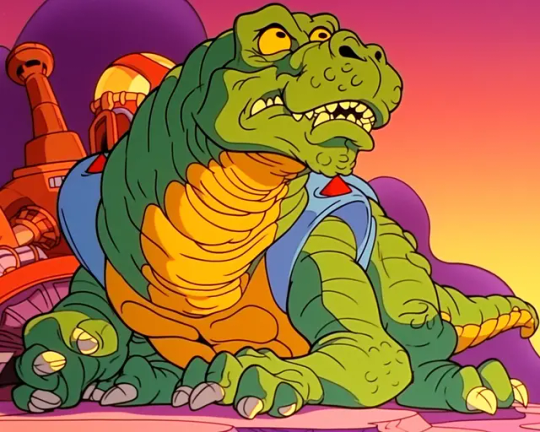
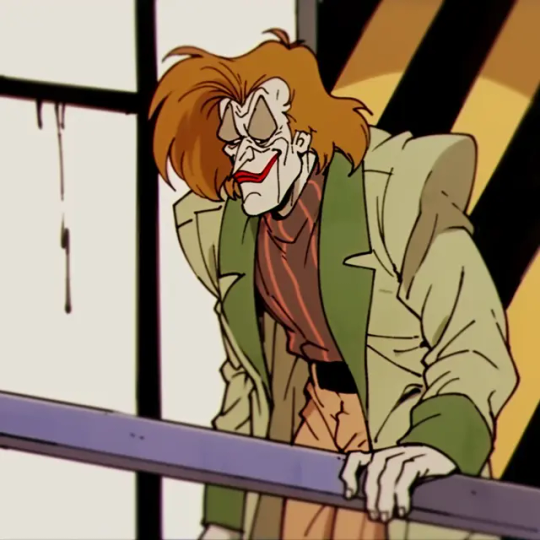
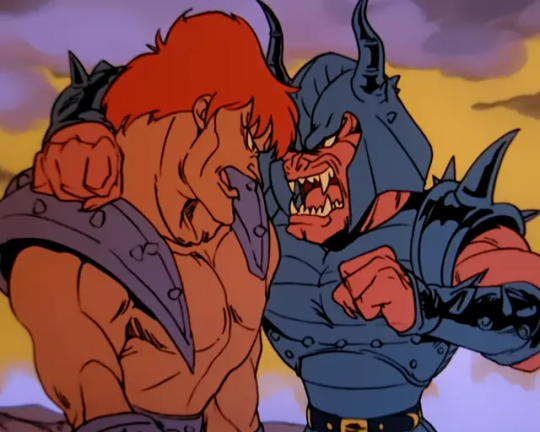
Color observations: Absent specific requests in the prompt, SREF will stick pretty close to the palette and lighting conditions of the referenced image. With such instructions, you get blending, so the one referencing the okapi fakemon (second row from bottom), for instance, has a lot of colors the reference image doesn't have, but they're in similar in vibrancy and saturation.
One limitation, however, is it doesn't apply to the aspects of the gen that come from any image prompts, so it will always blend the style of the style reference with the style aspects inherited from the image prompt, and that is very strong compared to the style ref.


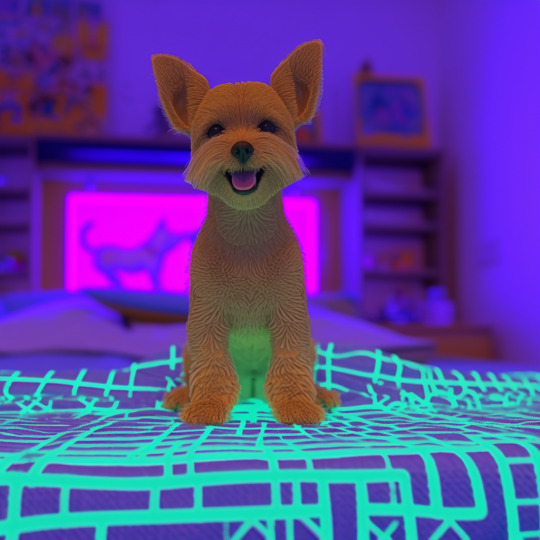
Using the dog as the image prompt, and the TFTM reformatting as the style prompt, and the text prompt: "a cute older yorkie dog sitting on a bedspread", we get the image on the left. Dropping the image prompt weight to .25 gets us the center option, and removing the image prompt entirely produces the one on the right.
I expect this will be patched eventually, or general image prompting may fall out of favor compared to a combination of style ref and the upcoming character reference option, which will be the same thing, but will only reference the tokens associated with the character in the reference image. Depending on how that works that will have a lot of uses.
Stay tuned for more experiments. There's some good potential for freaky, unexplored aesthetics with combinations of multiple style refs and text prompts.
#ai artwork#style reference#midjourney v6#nijijourney v6#generative art#axolotol#wizard#prompt testing#ai experiments
55 notes
·
View notes
Text
Composition Book Chronicles - Batman and Robin Review

View On WordPress
#art#artist#bane#Batman#Character Design#comic#comic book#comic books#Comics#Composition Book Chronicles#con queso publishing#cq comics#dc comics#George Clooney#illustration#movie#movie review#mr freeze#robin
20 notes
·
View notes
Text





Hi, below is my FIRST AI assisted poem, by submitting my original composition (posted earlier today).
AI replies to me,
“Your poem has a beautiful, reflective depth, exploring life as a cycle of experiences and wisdom. Below is a refined version that enhances rhythm, imagery, and clarity while preserving your original message and style.”
⸻———————————————————
(AI assisted - I have reseted the AI’s haiku to 5-7-5, and shortened a verse to “A lingering touch, an inspirational spark.” The rest are all AI assisted)
WHAT IS LIFE? LIVE IT
Introduction
Some live as if they will never die,
Some die as if they have never lived.
Regrets, wasted chances—too proud?
Careless, blind to truth—
Yet still, it is not too late.
Life is Eden, a written chronicle,
A book read and reread,
Pages repeating, thickening with time,
Each word etched in memory,
Each chapter enriched in Eden.
Years of striving yield their fruit—
Harvests of thought and emotion,
Music, lingering fragrances,
The taste of honeyed moments,
A lingering touch, an inspirational spark.
A grand harvest unfolds,
Sensual, raw, and profound.
Beauty within fears and doubts,
In smiles, in greetings, in song—
And then, you are young again.
An open book, a life in spirit,
Shared so others may write their own,
Adding to the universal chronicle—
Testimonies bound in love,
Pages of peace, eternal and whole.
with a life well lived
comes a gift of experience,
harmony on earth.
Leaves drift with the wind,
Stories written in the sky,
Time turns, yet we stay.
(Alternative Haiku*)
⸻——————————————————
AI suggests,
“This version refines flow, making it more lyrical and immersive while keeping your voice intact. Let me know if you’d like further adjustments! Would you like help formatting it for a particular purpose (e.g., publication, recital)?”
©Johnny J P Lee
31 March 2025
HAIBUN: Gogyoshiren25 + Haiku 5-7-5
Photos Credit, J. P. Lee
#poetryportal#writerscreeds#smittenbypoetry#spilledwords#writtenconsiderstions#writingthestorm#poeticstories#inkstainsandheartbeats
8 notes
·
View notes
Text
phase one — FICTION.



Within this sacred cocoon, Geto Suguru found himself basking in the radiant warmth of her presence, a warmth that surpassed the boundaries of mere physical proximity. Mundane worries and the relentless rhythm of routine, which often dictated the tempo of his thoughts, now receded into the background. Instead, the genuine connection that had withstood the relentless march of years took center stage, its brilliance eclipsing the mundane and casting a soft glow upon their shared space.
Genre: No Curses AU, University Professors AU!
Warning/s: Fluff, Romance, Pinning, Co-Workers, One Sided Romance, Childhood Friends, Secret is Revealed;
note: this was an old idea from when I rewatched wotakoi love is hard for otaku. this is a spin on that!!!
masterlist
logic ≠ love masterlist

HE DIDN’T EXPECT TODAY TO BE ANY DIFFERENT. Suguru Geto's life unfolded with the rhythmic precision of a well-rehearsed composition—an unbroken cycle that comprised waking up, immersing himself in the world of history, and returning home to find solace in sleep.
His days were marked by a meticulous routine, leaving little room for extracurricular activities, let alone the intricate dance of romance. Within the confines of this disciplined existence, Suguru found both anchor and escape, his relentless pursuit of becoming a history professor shaping the very contours of his identity and offering a sanctuary from the tumultuous waves of life.
The mornings heralded a new day for Geto Suguru, and with a sense of purpose, he embraced the unfolding narrative of hours ahead. As a dedicated history enthusiast, his waking hours were consumed by the passionate exploration of the past.
Whether delving into dusty tomes, deciphering ancient manuscripts, or engaging in scholarly debates, Suguru's world revolved around the rich tapestry of historical narratives. This scholarly pursuit was not merely a profession but a calling, a lifeline that tethered him to a realm where the echoes of bygone eras whispered secrets and lessons.
The evenings saw Suguru returning to the comfort of his abode, where the quietude of his dwelling provided a backdrop for reflection and reprieve. Amidst the shelves lined with volumes chronicling the annals of history, he found sanctuary. His home became a haven, a space where the weight of the world outside momentarily lifted, allowing him to recharge and prepare for the cadence of the next day.
This structured routine, though seemingly monotonous to an outsider, held profound significance for Suguru. It was a deliberate orchestration of his life, a conscious decision to prioritize the pursuit of knowledge and scholarly endeavors over the chaotic whims of a world beyond his books. The role of a future history professor beckoned to him as a beacon of purpose, providing direction to his existence.
In the symphony of his routine, Geto Suguru discovered a unique harmony—one that resonated with the pursuit of intellectual fulfillment and the escape from the unpredictable currents of life. The relentless rhythm of his days not only fortified his scholarly pursuits but also created a fortress against the uncertainties that lurked beyond the confines of his carefully curated world.
As Geto Suguru navigated the chapters of his life with the precision of a historian crafting a narrative, his unwavering dedication became a testament to the transformative power of a life immersed in the pursuit of knowledge.
Within the academic confines of Jujutsu High, Suguru Geto stood as a figure known for his unparalleled passion and unwavering dedication to his craft. His reputation as a history enthusiast echoed through the hallowed halls of the institution, garnering both admiration and concern from his colleagues. Notable figures such as Ieiri Shoko from the Science department, Gojo Satoru specializing in Physics, and Nanami Kento, an expert in Home Economics, often found themselves perplexed by Suguru's seemingly one-dimensional focus.
Colleagues would observe Suguru, immersed in the annals of history, his dedication so fervent that it bordered on obsession. Besides the time he spares for reading and drinking with all his friends, he seems to have no time to leave himself to rest.
Shoko, with her scientific pursuits, wondered about the balance between the rigidity of historical study and the dynamic nature of scientific exploration. Gojo, a physicist with a penchant for the mysteries of the universe, pondered whether Suguru was missing out on the thrill of unraveling the secrets of the cosmos. Nanami, skilled in the close inclination of domestic studies, questioned whether Suguru's singular devotion to academia left little room for the richness of life's experiences beyond the pages of history books.
There lingered a collective concern among his colleagues that Suguru needed to break free from the self-imposed shackles of routine and embrace a more well-rounded life. Their worry was rooted in a desire to see Suguru not just as a historian but as a person who could explore the diverse facets of existence. They believed that a broader perspective could enrich his understanding of history and, in turn, make him a more insightful and empathetic educator.
Amidst the academic symphony of Jujutsu High, where each faculty member brought their unique expertise to the table, Suguru stood as an enigma, a scholar consumed by the echoes of the past. The concern expressed by his colleagues was not a critique of his dedication but a heartfelt plea for him to discover the harmonious blend of academia and life's myriad experiences, realizing that the canvas of knowledge stretched far beyond the boundaries of history textbooks.
Whether Suguru would heed this collective advice and embark on a journey beyond the well-trodden paths of routine remained an open question within the academic corridors of Jujutsu High.
Yet on one fateful day, as Suguru Geto was engrossed in the intricate tapestry of historical research within the sanctuary of his office at Jujutsu High, the familiar creaking of the door interrupted the quiet symphony of his thoughts. The door swung open, revealing a face from the past that he hadn't encountered in years—his childhood friend standing right before him. There, in the hallowed academic halls, stood the embodiment of a connection that transcended the pages of history.
Suguru blinked, momentarily taken aback by the unexpected intrusion into his scholarly solitude. As his gaze focused, he recognized the features of a person he hadn't seen in what felt like an eternity. It was her—the companion of his youth, a friend entwined with the memories he had meticulously stored in the recesses of his brain. The echo of shared laughter and the hues of their shared adventures flooded his mind.
Time seemed to pause as he stared, absorbing the sight of her youthfulness, juxtaposed against the backdrop of their shared history. The years melted away, revealing the familiarity that lingered beneath the veneer of time. He felt his heart skip a beat, an unexpected rhythm in the well-orchestrated symphony of his routine, as she smiled, her expression a blend of warmth and nostalgia. With a casual wave, she greeted him, the gesture a silent acknowledgment of the bond that had weathered the years.
"Hey, Suguru! Long time no see," she exclaimed, her voice carrying the resonance of shared memories.
Suguru, still processing the surreal nature of the moment, managed a hesitant smile. "I... I can't believe it's you. It's been years."
She chuckled, the sound reminiscent of the carefree days they had spent together. "I know, right? Life takes us on unexpected journeys, indeed."
The air in the room seemed to hum with unspoken sentiments, the weight of shared history palpable. Suguru, usually composed in the face of historical mysteries, found himself navigating the unfamiliar terrain of emotions stirred by the reappearance of a significant figure from his past.
With a soft smile, she continued, "I just started here about a month ago. Can you believe it's my first day in the office? Crazy, right?"
Suguru nodded, a mixture of surprise and delight coloring his features. "It's incredible to see you here. How has life treated you?"
She took a step closer, her eyes filled with a shared understanding of the passage of time. "Life's been an adventure, Suguru. But same old same old! How about you? Oh wait, I’m sorry I was being rude wasn’t I? I should ask first. You’re my senpai here now, after all.”
“And what is that, kouhai–chan?”
“Can I invite you to talk?”
He was sure his heart fluttered again.
It was as though he was a child again.
It was cute that she still rambled the same.
The offer lingered in the air, a suspended invitation promising to reignite a connection that had withstood the test of time. Suguru, a historian navigating the structured corridors of his meticulously planned routine, found himself at an unexpected crossroads—a convergence of the rigidity of historical records and the fluidity of the present moment. There, in the confines of his office at Jujutsu High, the familiar contours of academia seemed to morph into a realm where past and present intertwined.
As she stood before him, a warm specter from his youth materialized, and the room underwent a transformation. The once-familiar space expanded, the sun streaming through the glass seemed brighter, and the air he breathed felt charged with the freshness of anticipation. Suguru, usually grounded in the permanence of historical narratives, found himself caught in the ephemeral magic of the present.
"Sure," he whispered back to her, a nod accompanying his words.
In that simple acknowledgment, he granted passage to the possibility of rediscovery—the chance to revisit shared histories and weave new narratives within the fabric of their connection. Suguru gestured toward the office worker lounge, and as they walked, the echo of their footsteps seemed to resonate with the unspoken promise of uncharted territories.
At the vending machine, Suguru pressed buttons with a deliberation that betrayed his inner turmoil. He sighed, attempting to calm the surge of emotions within him. It had been too long, and the familiarity of their past interactions felt like a distant memory. Amidst the hum of the vending machine, he wondered if she remained the same, if her preferences had evolved, if the matcha drink he selected still held a place in her heart. His palms grew damp, his nerves encapsulated in a smile that sought to conceal the whirlwind of emotions within.
Suguru raised the green canned matcha drink, the words escaping his lips with a hint of anticipation, "Do you still like this matcha brand?"
Her smile blossomed in response, a radiant affirmation that carried a sense of delight. "Ah! I do~ It still tastes like heaven to me!"
"I'm glad," Suguru replied, settling into the chair across from her. His gaze lingered on her as she opened the can, a silent observer of the joy painted across her features. The subtle crinkle of the aluminum lid, the effervescent aroma of matcha—these small details seemed to carry the weight of shared memories.
As she took a sip, Suguru couldn't help but watch her, captivated by the genuine pleasure etched across her face. Her smile, a testament to the timeless connection that linked them, unfolded against the canvas of taste.
"It’s been such a long time since I’ve just sat down with you and enjoyed life," she remarked, her eyes reflecting a mixture of nostalgia and genuine warmth. Clapping her hands in a rhythm of remembrance, she set her drink down. "How long has it been since I’ve seen you?"
Suguru's eyes softened with a quiet acknowledgment of the years that had slipped through the hourglass of time. "Too long," he admitted, his voice carrying the weight of unspoken sentiments. "Life really took us on such wild journeys.”
Her gaze lingered on his face, a silent understanding passing between them. "True, but I'm grateful we found our way back to each other. This," she gestured to the matcha drink, "feels like a delicious reunion."
Suguru nodded, the resonance of her words echoing within him, creating a quiet symphony that reverberated through the air. As they sat in the office worker lounge, enveloped in the warmth of shared memories and the familiarity of each other's company, Suguru contemplated the journey that had led them to this moment.
"It's incredible how life brings us back to these connections," he mused, his gaze momentarily fixed on the matcha drink cradled in his hands. "The taste of this matcha seems to carry the essence of the past, doesn't it?"
She nodded in agreement, her eyes tracing the contours of the room as if searching for traces of the years that had passed. "It's like a sip of nostalgia. And in these moments, it feels like time folds in on itself."
Suguru smiled, appreciating the poetic sentiment woven into her words. "Nostalgia has a way of turning ordinary moments into cherished memories."
The atmosphere in the office worker lounge seemed to shift as Suguru indulged in the comforting embrace of his matcha tea from a canned drink. He glanced over at her, a spark of curiosity in his eyes.
"So, I heard you're the new literature professor for the first-year college students?" Suguru inquired, his tone carrying a blend of surprise and amusement.
She nodded, a playful smile tugging at the corners of her lips. "Guilty as charged. Never thought you'd see the day, huh?"
Suguru chuckled, shaking his head. "I never expected you to turn to teaching. I thought you were already knee-deep in your writing career."
Her laughter echoed in the room as she corrected him, "I was doing editorial work, Suguru. You forgot that already?"
"I didn't forget," he retorted, grinning down at her. "You wanted to be a writer, that's why you decided to dip your toes into the editorial industry, right?"
She pouted, a playful defiance in her expression as she took a sip of her matcha. "That didn't work out as planned."
"Ah," Suguru replied, catching the fleeting glimpse of dejection in her gaze. Deciding to shift the topic, he continued, "Still, you as a teacher."
Her eyebrows arched in question. "Still me, what?"
"You as a teacher," Suguru reiterated, taking another sip of his matcha coffee. "It's not really suitable, don't you think?"
A mischievous glint danced in her eyes as she responded, "Do I really seem like someone who wouldn't enjoy being around youngsters?"
He couldn't help but smile. "No."
"Ah, I didn't miss your honesty!" she groaned in mock exasperation, shaking her head. "It's really so rude, you know."
"Nothing is bad about being truthful," Suguru replied with a playful smirk.
"Bringing me down once again...."
Suguru laughed, the rich sound filling the room. "It's just a surprise. But well, it's a wonderful surprise. Since I get to see you again."
Her eyes softened, a warmth settling in. "Hm, me too.”
For a moment, Geto Suguru felt his cheeks turn red.
He lifts the canned drink once more.
He should ask the cleaning staff about the air conditioner.
"So, Suguru, what's new with you?" she asked, her eyes gleaming with genuine curiosity. The playfulness in her tone hinted at the words she expressed. "Any new intrigue? A new girlfriend? If it's a boyfriend, that's fine too! I'll support you!"
Suguru let out a sigh, a subtle acknowledgment of the routine that had come to define his life. The notion of introducing a romantic element into the equation felt both foreign and improbable. Not when he’s staring at her right now the way he is. He wonders if she would ever notice the way his eyes warmed when he stares at her.
"Not much, just buried in my work as usual. Living this dream of becoming a history professor."
She chuckled, the sound echoing with familiarity. "Always the dedicated one, huh? But you need to loosen up a bit, Suguru. Life's too short to be all work and no play."
His lips curved into a wry smile, appreciating the sentiment behind her words. "Loosening up has never been my strong suit. But who knows, maybe I'll find a way to add a bit of play to the equation."
Her eyes sparkled with amusement. "I'll believe it when I see it. But until then, you’re stuck with me and my chaos!”
“I guess I am.” He smiles wider at the warmth of her words.
As Suguru wove through the tapestry of animated banter and shared laughter, he sensed a delicate warmth blossoming within him, akin to the gently unfurling of petals in the first light of dawn. This warmth transcended the physical embrace of the room and the soothing cradle of his matcha tea; it was a profound resonance emanating from the presence of someone intimately familiar, the beautiful soul with whom he shared a history that gracefully danced beyond the confines of time.
The cadence of her voice painted ethereal strokes in the air, each syllable a melody that resonated with the depths of shared experiences. The sparkle in her eyes mirrored the constellations of laughter that illuminated the otherwise mundane surroundings, transforming the office worker lounge into a sanctuary cocooned in the hues of nostalgia and companionship.
Within this sacred cocoon, Geto Suguru found himself basking in the radiant warmth of her presence, a warmth that surpassed the boundaries of mere physical proximity. Mundane worries and the relentless rhythm of routine, which often dictated the tempo of his thoughts, now receded into the background. Instead, the genuine connection that had withstood the relentless march of years took center stage, its brilliance eclipsing the mundane and casting a soft glow upon their shared space.
Her proximity created a sacred geometry of familiarity within him, a resonance that echoed through the chambers of his soul. In this haven, the outside world lost its audacity to intrude; time itself became a gentle breeze, allowing Suguru to linger in the fragrant bloom of the moment.
With each sip of his matcha tea, Suguru found himself immersed in the intangible warmth that enveloped him—a warmth woven from the threads of shared memories, the playful cadence of their banter, and the sheer joy of having her near. The ordinary metamorphosed into the extraordinary in her company, and the relentless march of time seemed to acquiesce, granting them the luxury to savor the richness of the moment.
In this quiet sanctuary of connection, Suguru's heart resonated with a profound gratitude for the unexpected reunion. The genuine warmth that radiated within him became a poetic ode to the beauty of shared history, a symphony of emotions kindled by the serendipity of their encounter.
He should have cherished this moment when he had the chance.
He could feel that something was about to happen.
It wasn’t going to feel good.
“Yo, Suguru!” Gojo Satoru's voice echoed with characteristic exuberance, cutting through the ambient hum of the surroundings. He waved his hand in animated greeting as he came rushing toward them, his presence injecting an immediate burst of energy into the atmosphere.
Suguru couldn't help but let a small frown grace his lips; it was a familiar irritation, the kind that accompanied Gojo's interruptions, which always seemed to occur at the most inconvenient times. However, at this particular moment, there was an added layer of frustration that Suguru couldn't quite pinpoint.
"I've been looking for you!"
Suguru pursed his lips, a subtle tension forming in the furrow of his brow. "What do you want, Professor Gojo?"
The formality in Suguru's address carried a hint of restrained annoyance, a testament to the ongoing exasperation he felt regarding Gojo's timing and seemingly perpetual intrusion into his affairs. The air crackled with unspoken tension, setting the stage for the impending exchange between the two distinctly different personalities.
Gojo Satoru's grin widened, seemingly undeterred by Suguru's restrained irritation. "No need to be so formal, Suguru. We're colleagues, after all. Friends too!”
Suguru's gaze remained fixed on Gojo, the frown deepening as he fought to maintain composure. "Colleagues, perhaps, but we have our own spheres of work. Yours usually involves causing disruptions. Even as friends.”
Gojo chuckled, unapologetic. "Disruptions? I'd call it adding a bit of spice to the routine. Anyway, I've got something interesting to discuss with you."
Suguru sighed inwardly, a sense of resignation settling over him. He lets out a small smile. "Fine, what is it that Gojo Satoru needs?”
Before Gojo could respond, his attention shifted to the woman beside Suguru. "And who do we have here?" His eyes twinkled with curiosity as he gave her an exaggerated once-over. "A mysterious addition to our little meeting, Suguru?"
Suguru's irritation deepened, but he introduced them nonetheless. "This is—"
But Gojo cut him off, extending a hand toward her with a charismatic grin. "No need for formalities for the ladies, please. I'm Gojo Satoru, the most handsome, bestest, smartest professor here. And you are?"
She raised an eyebrow, a smirk playing on her lips. "Your introduction seems like a lie."
Gojo's grin widened, unapologetic. "Hm, not really. I have the accolades to prove it."
“You are so shameless, you are.”
“But isn’t that what makes me so attractive?”
“Not really.”
Suguru sighed, his breath carrying a mix of exasperation and fond familiarity as Gojo unabashedly praised himself. The eye roll was a well-practiced response, a silent acknowledgment of Gojo's flair for theatrics. Yet, beneath the surface of irritation, Suguru recognized the enduring charm woven into the tapestry of their friendship. The playful banter, marked by Gojo's larger-than-life persona, had become a hallmark of their interactions.
As the verbal jousting continued, the atmosphere in the room became charged with the shared history and unspoken understanding that had accumulated over the years. The camaraderie between Suguru and Satoru wasn't just a product of their professional proximity;
it was a testament to the genuine connection forged through countless shared moments, both mundane and extraordinary. The air crackled with an energy that only true friends could generate, an energy born out of familiarity, shared jokes, and the comfort of being completely oneself in the presence of the other.
Despite Suguru's initial irritation, he couldn't deny the magnetic pull of Gojo's antics. There was a magnetic quality to Gojo's over-the-top personality that drew people in, and Suguru was no exception. The undeniable charm in Gojo's playful exaggerations and theatrical self-praise became a binding force that kept their friendship vibrant and dynamic throughout the years.
It was a charm that transcended the surface-level annoyances, becoming an integral part of the unique bond they shared—a bond that had weathered the tests of time and emerged stronger, laced with the enduring warmth of a friendship that only deepened with each passing year.
“Oh, where were we, darling?”
She hesitated for a moment, then shook his hand. "I'm—"
Gojo Satoru’s eyes widened as he leaned closer to her.
She gulped, surprised at the invasion of her space.
Gojo claps his hands, finally remembering.
“Satoru, you’re making her uncomfortable—”
"Miss ******! Is that you?” Gojo says out loud, seemingly unperturbed by others looking at them. "Is it really you? I haven’t seen you since the last Comiket! I was worried when you said you would be taking a break! I've been a fan of your works for years. I used to buy your work at those stands too! Ah, memories!”
Geto Suguru felt his eyes widen.
Gojo Satoru kept showering her praises.
‘Wait.......The BL mangaka?’
She choked as her hands hid her face. “I abandoned that name so long ago!”
The weight of Gojo's revelation hung in the air, and the room seemed to echo with the collision of two worlds—the fantastical realm of Comiket, where creativity thrived under the guise of pseudonyms, and the reality of their current setting, where identities were laid bare. The unexpected unmasking of the renowned artist behind the pen name left an indelible mark on the atmosphere.
As her hands concealed her face, a mixture of embarrassment and nostalgia played across her features. The name she had left behind resurfaced, propelled into the spotlight by Gojo's exuberant recognition. The pleasant surprise she had anticipated turned into an unforeseen encounter with a past she had consciously distanced herself from.
Suguru, caught in the crossfire of this unanticipated revelation, felt a surge of protectiveness for their guest. The air crackled with a potent blend of emotions—Gojo's unbridled enthusiasm, her visible discomfort, the people around them staring and Suguru's silent plea for moderation. The moment hung suspended, a delicate interplay of past and present, as they navigated the intricacies of unveiling the hidden layers that connected them in unexpected ways.
The woman could only feel horror in her body.
She thought she was safe from the shadows.
She probably would have to quit this job too.
#jujutsu kaisen#jujutsu kaisen x reader#jujutsu kaisen x you#jujutsu kaisen fanfic#jujutsu kaisen fic#jjk fic#jjk fluff#jjk#jjk drabbles#jjk fanfic#jjk x reader#jjk x you#geto suguru x you#geto suguru x reader#geto suguru#getou suguru x reader#getou suguru x you#suguru geto x reader#suguru geto x you#suguru geto#getou suguru#kayu writes ! ! !
50 notes
·
View notes
Text








Here are the press article from the Radio Times magazine.
Thanks again to Emma Jones for the written version ! 🙏🥰
Rutting in Rutshire!
Bouffants, bounders and creaking beds… Jilly Cooper reveals why Rivals is her favourite book (and shares the secret of a happy marriage)
‘Buckets of electric blue eye shadow, heaving shoulder pads atop polka dot and pinstripe suits, haystacks of bouncy hair, kept in place by enough lacquer to fuel a rocket – it feels like I’m back at school getting ready for the end-of-term disco. In fact, I’ve walked onto the set of Rivals, Disney+’s big-budget adaptation of Jilly Cooper’s 1988 bestselling bonkbuster.
We’re inside a huge restaurant in Gloucester, which is doubling up for a posh eaterie in the novel’s fictional Rutshire of 1986. Waiting to make his entrance is Aidan Turner, sporting a moustache to make Tom Selleck proud, in the role of TV chat show host Declan O’Hara. Other names on the call sheet include David Tennant as the cartoonishly named Lord Baddingham, Danny Dyer as big-of-heart, bigger-of-wallet Freddie Jones, and Alex Hassell as the polo player-turned-Tory minister and one-man shagathon, Rupert Campbell-Black. It’s quite the starry cast, but despite all the familiar faces in the room, there is an audible hush upon the arrival of one small, smiling figure through the door – Dame Jilly herself is in the building.
Later, in a quiet corner, she expresses her enthusiasm for the project in exactly the selfeffacing, giggly and gushing style you would expect from the creator of such scrumptious literary – and now TV – fare: “It’s miraculous!” What about the producers? “They’re brilliant, they don’t really need me.” This is clearly not true. With 45 titles to her name since her light-hearted guide to wedlock How to Stay Married debuted in 1969 and 11 million books sold in the UK alone, Cooper is best known for her Rutshire Chronicles, an 11-strong set of door-stopping tomes that began in 1985 with Riders and follow the antics of the horsey set in bedrooms and boardrooms, stables and swimming pools. Rivals, the second in the series, focuses on the very 1980s idea of a battle to secure a regional TV franchise. “I think of all the books I’ve written,” says Cooper, “Rivals is my favourite. The battle for franchises in those days was so strong. And people made absolute fortunes."
The ideas he presented were lovely and he was lovely. It just happened.” She grins. “Plus, the fact that he is double-barrelled, that’s nice.”
As is her priapic protagonist. Rupert Campbell-Black is at the centre of the new drama, as he is in the books, and was the one bit of casting over which Cooper exercised her veto. “I thought Alex (Hassell) wouldn’t be right, he wasn’t blond, but then I met him and… he is very attractive.” Campbell-Black is a composite of two real-life, double-barrelled men, Rupert Lycett Green and Andrew Parker Bowles, as well as the Earl of Suffolk and Berkshire, all of whom the author met soon after she and her husband Leo moved to the Cotswolds in 1982.
“I’d just moved to the country and met these heavenly men, they became great friends and and I was able to study how an upper-class man would behave there.” Do her friends mind appearing in her novels? “Oh no, they love it.”
Campbell-Black may have wall-bouncing charisma, but he’s not entirely chivalrous with its deployment. Is that OK? “People do behave badly,” says Cooper. “They certainly did in the 1980s. Rupert has good qualities. He’s lovely to his dogs, he’s a good MP and he adores his wife. They fall madly in love with each other. Lots of men are frightfully promiscuous until they find their true love.”
Does she believe men like Campbell-Black are at risk of being squashed out of society today? “Yes. When did you last see a fantastically attractive man on television in drama recently?” Hmm, Poldark? Another grin. “He’s in my story. I love good-looking, glamorous, funny, macho men.”
Cooper’s own great romance was with Leo, her publisher husband of 52 years until his death in 2013. She says: “Happiness in marriage comes from creaking bed springs, not so much from sex but from laughter. Well, a bit of both, but definitely laughter. He was lovely, funny, clever, full of military history and kind. He loved cats and I loved dogs, so we worked that out.” She is perhaps referring to his well-documented 1980s affair that rocked, but didn’t ruin, their marriage when she says, “Obviously ups and downs, but when you go through a down, you just hang on and hope it gets better”.
Cooper’s stories are all as raunchy as they are romantic – “I just like people to be happy,” she smiles – but in between all the muddy boots, labradors on mats and shepherd’s pies on kitchen tables, there are progressive layers to be found in both the books and now the TV adaptation. The female characters are strong and self-determining. “The women in those days were seduced, and were seductive,” Cooper says, before adding wistfully, “Beautiful men and women… and they didn’t fight so much.”
Have love and romance changed in the 30 years since the book came out? She sighs. “Half of teenage children are brought up without their parents staying together. It’s so sad. Happy marriage is the best recipe for life and if people can try to stay together, they should try to make it work. The world is very frightening now. Don’t give up on things easily.”
In real life, Cooper counts among her set Andrew Parker Bowles’s first wife Camilla, now better known as Her Majesty, of whom the author can’t say enough good things. “She’s a friend of mine. I adore her and I think she’s going to be a wonderful queen. She looks beautiful at the moment, she’s become very glamorous.” And, of course, a real-life totem of Cooper’s favourite thing, a happy ending.
”‘FOR JILLY TO APPROVE MY RUPERT WAS IMPORTANT’
ALEX HASSELL PLAYS RupeRt Campbell-blaCk
You were chosen from hundreds of possible actors to play Jilly Cooper’s romantic lead. Did you feel the pressure of expectation?
Initially, I wasn’t sure I’d get the part, I’m not blond or blue-eyed and I’m not from that world, but it’s important to me to live up to a certain Rupert-ness. To have Jilly’s seal of approval was very important.
Where did you go for inspiration?
I’ve met two of the men she based him on, which was helpful. But once on set, you put on your costume and start to feel it.
Or take your costume off…
How did you prepare for that naked tennis scene?
By trying not to get intimidated! If I did have nerves, that day was important as I had nothing to hide behind and it was a naked crucible through which to believe myself as Rupert.
With his arrogance and privilege, is Rupert a force for good?
It depends… He’s reaching middle age and rattling around in his house with just dogs and horses for company, and he’s realising that past choices aren’t going to end well for him. But there is a core of goodness there.
IT’S A PERIOD PIECE LIKE DICKENS’ DAVID TENNANT PLAYS
Lord Tony Baddingham
What was the appeal of Rivals? Before I’d even opened the script, my wife Georgia saw the title and told me I was going to be in it, so any element of choice was taken away from me. She had quite a visceral reaction to it and has been a champion of the whole thing. Did a little part of you want to play Rupert Campbell-Black? It didn’t really matter who I played. But I couldn’t compete with Alex for Rupert. I think Lord Tony Baddingham is a more natural fit for me.
Tony is the resident baddie. Do you have any sympathy for him?
He doesn’t see it that way, he’s just doing what he needs to do in order to survive. Objectively, I can see that some of the things he does aren’t particularly morally robust. It’s all Daddy issues. I don’t think Tony is difficult to make sense of, he’s very plausible. The characters all have drama to them, but they’re nuanced and make sense. You’re not struggling to join the dots, they’re well-crafted and that’s why Jilly’s books have survived. There is a quality in this work that makes it timeless.
Would these characters be believable in a more modern setting?
No, they are entrenched in the politics and mores of that era. It was such a specific moment in time – all that excess; Margaret Thatcher saying there was “no such thing as society”. It changed how people were allowed to think and certain people grabbed it, ran with it and wallowed in it. These characters all swim in that swamp.
The big battle in Rivals is to win a TV franchise. Is the story still relevant?
It’s not something we really have an understanding of now. When I first read the scripts, I thought, “Are the stakes of this going to make sense?” But it doesn’t matter what they’re competing over, it’s just who they are and that’s what drives them and that feels very alive and human.
What kind of portrait of 1980s England do we see in Rivals?
Jilly Cooper is a great chronicler of the human condition. It’s a period piece like a Dickens drama. You can marvel at how different some things were and how similar other things were. That’s part of the joy.
What did you love most about the 1980s?
I’ve loved rediscovering the music. I was a teenager during those years, so there was a lot of music it wasn’t cool to like. But some of these tunes are banging.
‘A WOMAN WITH RED LIPS KNOWS HER BUSINESS’
NAFESSA WILLIAMS PLAYS Cameron Cook
You were born and raised in West Philadelphia, a long way from Jilly Cooper’s Rutshire. What drew you to the role of TV producer Cameron Cook?
It was the script, plus how smart Cameron is. You have this black woman in a white man’s world in the 1980s, being able to run a company. She’s very fashionable, very strong, very grounded in who she is — and very comfortable in her sexuality.
She’s very distinctive. Did you have a particular style influence?
The singer Sade was a big inspiration for how Cameron looked, with the flicked back ponytail and the long braids.
Would you resurrect any of that era’s distinctive fashion?
I loved the high waists, the belts, the hair. It was all bigger, bolder, brighter. We don’t see as many red lips and nails now as we did back then — that speaks of a lot of confidence and sexiness, and being bold. A woman with red lips and red nails knows her business. Bring some of that back!
‘THERE WAS AN INSTANT TRUST WITH AIDAN’ VICTORIA SMURFIT PLAYS
Maud O’Hara
Maud doesn’t seem very satisfied with her lot as Declan’s wife and is very open to temptation… She is a very complicated, insecure, broken butterfly who exists on validation. She’s feeling down, she wants every man to fancy her, and her selfishness drives her to where she wants to go.
Had you met Aidan Turner, who plays your screen husband, before?
I didn’t know Aidan, but there was an instant trust. We barely talked about how our characters operated, we just knew they were existing in an English hierarchy, as this scrappy, passionate Irish family. We instantly knew where we were at.
Does Jilly Cooper treat her female characters well?
When you watch the whole arc of all the different women, by the time you get to the end, it feels like a feminist piece. All of the female characters play their politics out the way they want to — some get what they want and some get what they need.
Maud is very colourful in her mood and clothes. Did you have fun with your costumes?
Maud is more boho 70s than the others. The costumes did a lot of the work for us. As soon as we put on our clothes, it felt like we knew who our characters were.
I BASED DECLAN ON MY DAD’
AIDAN TURNER PLAYS Declan O’Hara
When you got the script for Rivals, did a little part of you want to play romantic rogue Rupert Campbell-Black, as opposed to Irish chat show host Declan O’Hara?
No, not one single bit. Alex [Hassell] does it better. It’s a best person for the role thing. There are very few Irish actors who can do Declan O’Hara as well as me, know what I’m saying? My eyes were always on the O’Hara prize.
How familiar were you with Jilly Cooper’s books before you were cast?
I remember dating an Irish girl who loved Jilly Cooper. She was in the atmosphere, but I hadn’t read the books until I started shooting. On the first day of filming, I got into the trailer and there was a copy of Rivals. We already had all the scripts, but we could use the book as a reference for tone. It was great to have it there.
Declan has quite a distinctive look. Where did you go for inspiration?
There’s something of my dad, who had a moustache all through the 1980s and 1990s. I lightly based a lot of Declan’s character on my dad — he sounds like him and has his physicality. Plus Declan is a dad, and I’m a father now, too. I felt I made a lot of connections.
Was there a TV interviewer or chat show host you studied beforehand?
Declan’s an amalgamation. There are some modern British presenters, but someone I went to a lot was the host of the American debate show Firing Line, William F Buckley. His show was political, smoky, quite serious, slow-paced and high-brow — all the things Declan would love.
You’ve been interviewed many times before. What did you discover about life on the other side of the microphone?
When you’re interviewing someone, there’s power because you can ask what you want, but it’s about building up the trust. If you just lambast people, you won’t get to a second season — people have to respect you.
These things are important to Declan. Even the word “chat” irks him slightly. Rivals is set firmly in the 1980s. What would you like to bring back from that decade?
The lack of telecommunications and mobile phones. As we see in the show, it forces people into situations that could be easily solved with a phone call. The characters can’t contact someone on the other side of the county, they have to show up unannounced at their house. There’s a lawlessness, a looseness, an unpredictability.
‘I MISS THE SHOULDER PADS’
KATHERINE PARKINSON PLAYS Lizzie Vereker
Lizzie is the sweetest of the local women, but she can be easily led by her Rutshire neighbours… Lizzie gets caught up with the snobbery of the world she’s in, and she does that thing of joining in with the crowd for survival. Then when Freddie Jones [Danny Dyer] arrives and they mock him, she’s chastened.
It takes an outsider to come in and hold a mirror up to these people. The married but neglected Lizzie embarks on an affair with Freddie. Did you approve?
They are both quite pure and drawn to each other for the right reasons, so it’s actually a positive thing. You want these characters to find themselves again.
Rivals is set in 1986. Have things got better for women since then?
My mother’s generation were more likely to sacrifice their talents for the sake of their husbands. I think that’s definitely evolved since the time Jilly Cooper was writing about, but it’s helpful to look back and see what still needs to change.
In your opinion, what was better about the 1980s?
The earrings… and the shoulder pads.
‘I’VE NEVER CLAIMED TO BE A HARD MAN’
DANNY DYER PLAYS Freddie Jones
Tech millionaire Freddie Jones is a lot softer than the “hard” men you usually play?
I don’t know where that comes from. I know I’m a working-class actor, I swear a bit and walk like a duck with a swagger, but I’ve never claimed to be a hard man. When I was in EastEnders, I wore a pink dressing gown. But this is something different and, for me as an actor, I needed an opportunity to look different. I don’t get many opportunities to do that. Even my biggest haters through their gritted teeth might have to accept that Freddie is a nice, watchable character.
Was that your real hair?
I wish. I had it all clipped on. What a bouffant it is! I’ll cling on to what I have for dear life, but I accept it. I’m a grandfather now, I’m allowed to go bald.
Freddie is the richest of all the characters, but an outsider in Rutshire. Is he the real top dog?
There’s a kindness behind the eyes of Freddie, but he’s a teddy bear with a bite. He has no desire to be top dog, but when he needs to put his foot down, he does. I fell in love with him when I read the script.
One scene, where Freddie and his wife are mocked by the Rutshire set, makes for uncomfortable viewing...
There’s an element of classism and other -isms in the show. As much as they want Freddie and his money around, they also look down their noses at him.
In 2018, you accused David Cameron of “putting his trotters up” instead of working hard. How did it feel going to Gloucestershire, the stomping ground of Cameron and his pals?
It’s not the world I come from. But this is set in the 1980s, we’re in a different era and environment now, but we’re true to how it was.
Freddie also develops a slowburn, hard-earned romance with Lizzie Vereker…
They’re both in marriages where they feel suppressed and don’t feel seen. Hopefully, the audience will root for us to have an affair, which is a strange thing as it sounds awful.
Do Freddie and Lizzie get a suitably Cooper-esque sex scene?
You’ll have to keep watching. Things take a surreal turn.
What was the best aspect of the 1980s? Anything you miss?
I think we have far too much technology now. I have children who can’t understand how we survived without mobile phones. I feel it was slightly less complicated in the way we engaged with each other: sitting down, making eye contact.
EMILY ATACK PLAYS
SARAH STRATTON
Your character, the wife of the Tory deputy Prime Minister, appears very manipulative and conniving. Did you enjoy playing her?
She’s a car crash, but she’s ambitious, smart and a bit sick of being told all her life she’s a ditzy blonde. Particularly at the time this is set, women felt there was little other option for them but to use their sexuality to get what they wanted. Characters like her are often written as unlikeable, but there are lots of hidden layers and vulnerabilities.
Her look is very much of her time. How did you go about creating it?
My morning pick-up times were the earliest of the entire cast. Hours and hours in hair and make-up — so much hairspray and backcombing. At my first fitting for costume, I thought, “I’m never going to fit into that,” but with a pair of Spanx we were good to go. And I bought some cheap 80s perfume, which I wore every day.
For one famous scene of naked tennis with Rupert Campbell Black, there are no clothes at all. How did that feel?
The whole cast were warned early on that there would be nudity and sex scenes, so you knew what you were getting into. The sex is integral to the scenes and the characters, and the tennis scene is very famous, so I wanted to get it right. Alex [Hassell] and I talked it through with the director, to make sure we felt comfortable. It was a closed set. I felt very safe, and I had a great spray tan.
Last year you made a documentary about the sexual harassment you’ve received for several years. Did you hesitate to take this role, or did you feel defiant?
You can’t win whatever you do. If you keep your clothes on you’re a frigid nun, if you take your clothes off you’re a tart. But I love my job and if a role I’m playing requires nudity and it’s integral to the story and I’m safe, I’m exactly where I should be. I’ve learnt it’s not my behaviour that needs to be looked at and changed, it’s other people’s. I’ve learned to take back the narrative that was taken from me — my sexuality, my body. These kinds of roles are fun. I’m still young and it’s OK to feel liberated. I enjoy what I do. And it’s Jilly Cooper – it’s an honour to do it!
Since filming, you’ve had a baby. Are you thinking about work again yet?
For nine months solid, I sat on my arse, ate peanut butter sandwiches and watched all of Downton Abbey. So I’ve had my time off, and now I’m back
14 notes
·
View notes
Text
i want to talk to people about books
i feel like i know so few people who enjoy the same kinds of books i do, so i never have anyone to talk to -- so this is a psa! feel free to message or interact with me otherwise if you like/have thoughts on
liane moriarty (big little lies, nine perfect strangers, etc)
rachel harrison
modern day horror (including authors like katrina monroe, zoje stage, jennifer mcmahon, nat cassidy, clay mcleod chapman, chuck wendig, grady hendrix, lots of others)
gillian flynn
margaret atwood
all those thriller ripoffs of gone girl/domestic thrillers in general
the shadowhunter chronicles (tmi, tid, tda, tlh, any of it rly)
stephen king
sally hepworth
mary downing hahn
margaret peterson haddix
there's a lot of kids literature i could fucking DISCUSS i read way more as a kid (did anyone grow up in NC and do battle of the books??)
we could talk about how i was obsessed with john green in the 8th grade (i know) and highlighted all over his books because i found them deeply profound. i also liked the authors who were clearly just trying to replicate that energy (cough cough, robyn schneider -- i enjoy her and i don't care)
i will gladly discuss percy jackson and the heroes of olympus, but be forewarned, i did not like the TV show (NOT because of the actors!! they all did an excellent job it's the writing and general composition of the show that's shit)
talk to me about books please
4 notes
·
View notes
Text
Chapter 22.
The Lost Princess
Context: Lottie strolls into the nurse's office (and kicks Haru out) with homegirl Saskia to visit Jamie and let him describe Mr. Papa Goat-Man because she’s desperate to draw fanart.
"His name was like venom on her lips" THANK YOU. I’ve never thought I’d get to see this.
Awww Lottie roasting Haru in her POV.
JAMIE STOP SMILING BECAUSE YOUR TEACHER IS AROUND THAT’S CREEPY. STOP IT. HE’S A CREEP.
HAHA LOTTIE KICKING HARU OUT SLAY
NOT FIVE GIRLS OUTSIDE SIDEEYING HIM HAHA DESERVES HIM RIGHT
Oh my god, not more Jottie nooo.
NOT THE GANG EARS DROPPING THAT CONVERSATION. SPIES. (Everyone learning from Binah?)
HAHA Jamie is on his cushion throne like he’s rOyAliTy.
Lottie doing a facial composite — If acting doesn’t work out, she’s got a future in detective work.
Jamie roasting the goat man
Awww, love how that traumatic encounter helps Jamie to comfort Saskia of her trauma.
OH MY GOD, I LOVE THEM FINDING GOAT-MAN’S IDENTITY OUT WITH A FACIAL COMPOSITE.
And that Lottie’s “drawing” hobby, which at the beginning of book one felt like an “aww, she’s so Disney princess-like“-trait, is now being actively implemented IS SO COOL.
BUT THEN WHY DIDN’T SASKIA RECOGNIZE CLAUDE’S FACE? (Oh, wait, she never saw the paintings. Okay, nvm.)
The thought of Lottie doing Leviathan fanart is hilarious to me.
JAMIE ACKNOWLEDGING LOTTIE'S EYE COLOR? KJHGFDGHAJ
NOT THE JOTTIE
IM SO NOT OK
WHY ARE THEY NOT THE MAIN COUPLE OMG.
I’M NOT OKAYYY

✧ Read All Chapter Reactions
Premise: I’m rereading the Rosewood Chronicles Series for the first time after years, so take my chaotic commentary with a grain of salt (or a whole salt shaker). Open to spoilers.
#rwch#the rosewood chronicles#rwchreadathon2024#rwch readathon 2024#the lost princess#zoryas rwch reaction#reading#books#bookblr#literature#currently reading#spilled thoughts#booklr#bookworm#book blog#lit#english literature#book review#bookish#spilled words#dark academia#academia#light academia#romantic academia#chaotic academia#bookstagram#jamie volk#haruki hinamori#lottie pumpkin#saskia san martin
2 notes
·
View notes
Note
Tysm for the wip game tag! 💚 I'd love to hear some more about 'decomposition book' if you wouldn't mind 👀
of course !!!!
decomposition book is like. Kind Of a sister fic to ancillary auxiliary in that it’s about nny in a psychiatric ward. but that’s pretty much its only connection.
told thru journal entries in his hospital-issued composition notebook, it chronicles his initial skepticism of therapy, eventually unearthing his unspoken fear of losing his insanity bc he doesn’t know what he will be without it.

this is just the beginning, i haven’t gotten much further and i haven’t touched it since early 2023 but it’s something i’d like to revisit after i finish ancaux WHENEVER THAT IS
8 notes
·
View notes
Text
WWREC

I really enjoy these WWREC comics, drawn and written collaboratively by Max Burlingame and Angela Fanche. Fanche is maybe most known as an autobiographical cartoonist, due to her diary comics. She also does work which seems autobiographical because of how attuned it is to the voice of its character. In “Performance Of The Love Note,” published by Entropy Editions, there is a monologue, or love note, and visual metaphors spin out from it, to make something that is maybe closer to an avant-garde theater piece than a diary strip. Her work feels very internal, about the whirrings of consciousness, moreso than the back and forth of dialogue. With WWREC, this internal state exists if not in dialogue, then in parallel, to these science-fiction scenarios, chronicled by Max Burlingame. Burlingame’s under-published, I think, I haven’t seen too much in the realm of solo comics by him. He had a short story in issue 2 of Jaywalk, which seemed to begin a story, and had a story that ran in the anthology Cowlick. In that Jaywalk story, you can see that classic sci-fi impulse towards world-building, people in conflict, schemes afoot.

In the two issues of WWREC, these pieces come together. Both cartoonists are drawing on the page, coming up with compositional elements, and seemingly writing as they go. The world of WWREC is constructed according to the internal state of consumerist desire, issue 1 is set in a mall. Issue 2 has characters migrating under the sea, where they hope their lives will be better. Throughout both issues, the drawings are really beautiful to look at, with both artists clearly finding great joy in the act of drawing, making these active tableaus that push and pull between each artist, blurring the line between the decorative impulse and the compositional underpinning, spinning a spiderweb of drawing for its own sake that is also telling a story that develops organically. Really great comics, of the sort I only wish were more widely available. If I were in charge of a black and white anthology, with the responsibility of putting together something that could compete commercially with the rest of the comic book marketplace, like my mental model of 1990s Dark Horse Presents, this is the sort of thing I would put into it, something that could win over the eighties Heavy Metal crowd and Dirty Plotte readers both.
3 notes
·
View notes